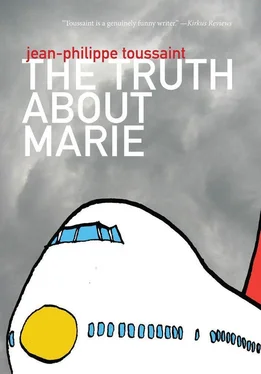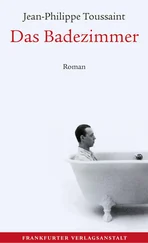Marie, standing still, her arms crossed, became lost in thought while observing the jockeys’ uniforms, their motley mix of colors and patterns, and she imagined a designer line fashioned after jockey-wear, appropriating the geometrical motifs of their silks, combining arrangements of circles and rhombi, crosses, stars, with shoulder pads and braided ties, a plethora of polka dots, stripes, chevrons, suspenders, plaited designs and sharp facings, where, against magenta or solferino reds, she’d experiment with cherry sleeves, red poppy or mandarin caps, sorrel backs. She’d play with raspberry, daffodil, nasturtium, copper, lilac, periwinkle, straw, and corn shades, using delicate materials and Indian tissue, silks pure and mixed, taffeta, tussah, and kosa, and, for the final bouquet, she’d end the show with a cavalcade of models on the runway, a herd of galloping fillies, hair in the wind, wearing dresses of all colors: chestnut, black, roan, bay, palomino, agouti, Isabella, and champagne.
Marie asked Jean-Christophe de G. if in every language people referred to the color of a horse as its robe . Do they use the corresponding word in English, for example? Do they speak of a horse’s dress ? Jean-Christophe de G. told her no, in English, they say coat —because of the weather, he explained to her, smiling, in France the horses are happy to wear a dress, in England, they need a jacket (and an umbrella, of course, he added stolidly). Jean-Christophe de G. and Marie had arrived at the Tokyo Racecourse in the early afternoon. They’d watched the first races from their reserved box seats on the top level of the stadium where, in luxurious private rooms, big panoramic bay windows looked out over the tracks with sweeping views of the entire stadium. A thick fog hovered on the horizon this day and filled the stadium with its mist. Listless, distracted, Marie watched the races from the bay window, following indifferently a surreal pack of thoroughbreds racing through the fog, her eyes drifting slowly along the walls on the opposite side of the track as the horses passed. Jean-Christophe de G. came to get her at times and they’d go through the glass door and into the grandstand to watch the finish outside, and, at once, in the humidity and wind, they’d be struck by the clamor of eighty thousand spectators cheering on the horses at the finish line, a wave of roars and frantic cries, a fury of fists lifted or pumping, the tumult peaking at the last stretch before slowly fading after the finish line had been crossed. The owners returned then to their private rooms, lounged in their boxes. Uniformed hostesses bowed as they passed, lowering their heads ceremonially, the owners going for a drink at the bar or reliving the race through one of the many television screens showing replays in the private rooms.
The horses’ march was nearing its end in the paddock, the jockeys were shaking hands with the owners. Here and there, waiting to mount their horse on the path, striding alongside them, the jockeys climbed onto their saddles in one movement, swift, graceful, and the horses’ march continued, the jockeys now mounted, still led along by the stable hands. Marie kept her eyes on Zahir’s jockey, an Irish man dressed in the Ganay racing colors, yellow jersey, green cap. He was adjusting the strap of his cap, fixing it around his chin, his legs still free on the horse’s sides, his boots not yet positioned in the stirrups. Leaving the paddock, the horses headed in the direction of the starting stalls, breaking into a light cantor on the track, the jockeys standing in their stirrups, as though floating suspended above their saddles.
The owners were already leaving the paddock. Jean-Christophe de G. and Marie rushed through the crowd in the grandstand to return to their box. They went down the vast hall of the lower level and strode quickly through the smoky area with its ticket windows and betting stations, tough-looking people in short jackets, arguing and bustling about, and they passed small puddles of spilled drinks and rain, with old betting tickets strewn about, as well as discarded food packages and racing newspapers open on full-page photos of jockeys, their colors faded, bordered on each side by headlines written in kanji. Hundreds of betters were waiting in line at the betting stations, glancing up at the hanging screens to check the latest odds, consulting their programs and marking the name of this or that horse. Some, seated on the floor, in suits, their shoes removed, ties undone, ate sticky rice with chopsticks without taking their eyes off the screens, slurping brown tea from small plastic cups, their shoes placed neatly in front of them. There was an unrelenting uproar in the room, the smell of rain and wet tobacco mixing together with wafts of soy and teriyaki. Jean-Christophe de G. and Marie had reached an escalator joining the first and second floor, then they took another to get up to the third. Announcements made in Japanese resounded without interruption from every speaker. On the upper level, the space was brighter, less smoky, the crowd thinner in the passageways. This level was a network of connected halls and glass walkways as in a large shopping mall, a raised maze of interior bridges, cafés, restaurants, and souvenir shops. A final private escalator led to the private boxes of officials and owners. A three-armed metal turnstile blocked its entrance, where hostesses in tight pink suits greeted guests and owners. Jean-Christophe de G. slid a magnetic card into the turnstile to pass through with Marie. They let themselves be carried up to the VIP rooms of the racetrack, side by side on the escalator, looking down on the bustling activity below, when Marie spotted me in the crowd.
She spotted me, there, alone, standing in the large passageway. She didn’t make a move, didn’t venture the slightest gesture of recognition, her heart had stopped beating. It had been several days since I’d vanished from her life, without once contacting her, she didn’t even know if I was still in Tokyo. She was nonetheless certain it was me, she’d recognized my demeanor, my profile as I stood with a basket of takoyaki , eating takoyaki with chopsticks, slightly removed from the rest of the crowd. The takoyaki steamed lightly in the basket, with small brown shreds of dried bonito finely grated into curly shavings that glowed and seemed almost alive in the heat.
What was I doing there? It was highly unlikely for me to be there, the probability of my going to the races in Tokyo on this one day was minimal (in the morning I came across an article in the Japan Times announcing the event), and the probability of Marie being there at the same time was virtually null. And here I was suddenly and unexpectedly in her presence, and I had seen her too, I saw Marie from a good sixty feet away, motionless on the steps of the escalator, accompanied by a man whom I didn’t know, an older man in an elegant dark jacket and cashmere scarf. She wasn’t on his arm but she was definitely with him, this much was clear, she was with him silently, she was with him violently, the tiny distance between them was even more violent in that they remained slightly apart — there was no contact between them, their shoulders may have brushed but a minute gap remained between their sleeves. I looked at Marie, and it was clear to me then that I was no longer there, that I wasn’t the one with her anymore, this man’s presence revealed nothing if not the reality of my absence. I had before my eyes the striking revelation of my own absence. It was as though I’d realized visually and all of a sudden that, for a few days already, I had disappeared from Marie’s life, and I knew at that moment she’d continue to live without me, she’d live on in my absence — and probably with even more intensity as I continued to think about her all the time.
Читать дальше












